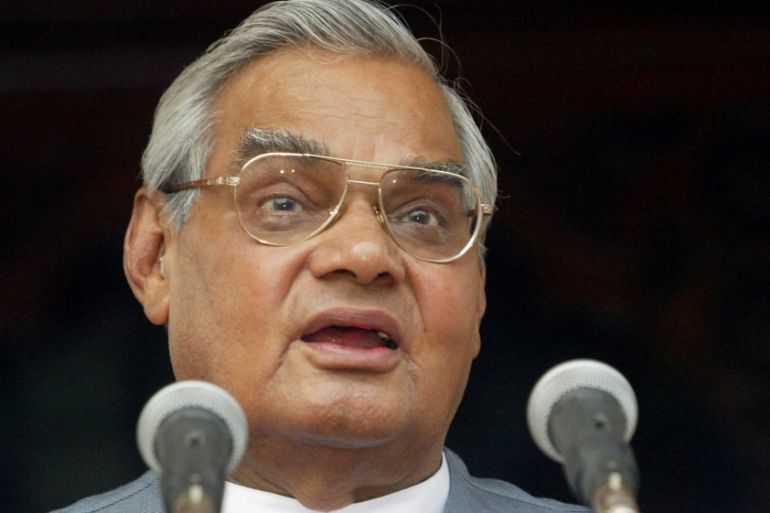Former Indian PM Atal Bihari Vajpayee dies
The 93-year-old, who led India three times, had been hospitalised since June with a kidney infection and chest problems.

Former Indian Prime Minister Atal Bihari Vajpayee, a Hindu nationalist who set off a nuclear arms race with neighbouring Pakistan, has died at the age of 93.
The All India Institute of Medical Sciences, where Vajpayee had been hospitalised for more than two months with a kidney infection and chest congestion, announced his death on Thursday.
Keep reading
list of 4 itemsKey takeaways as ex-Trump lawyer Michael Cohen testifies in New York trial
Top US Senator Bob Menendez’s corruption trial begins
UK charges three with working for Hong Kong intelligence
One of India’s longest-serving politicians, Vajpayee was elected nine times to the powerful Lok Sabha, or lower house of Parliament, and served as foreign minister from 1977 to 1980.
But it was his time as prime minister for which he is greatly remembered.
He served three times: for 13 days in 1996, before he resigned in the face of a no-confidence motion. Eleven months in 1998 to 1999, and then from 1999 to 2004.
Nuclear programme
Vajpayee was a key figure in the development of India’s nuclear programme and gave the go-ahead for underground nuclear tests in 1998, believing nuclear weapons would be a deterrent against China and Pakistan.
“We will not use these weapons against anybody. But to defend ourselves, if the need arises, we will not hesitate,” Vajpayee vowed at that time.
Pakistan responded to those tests with six of its own, launching both countries on a race to amass the weapons.
But it was the same Vajpayee who later embarked on a historic bus ride to the Pakistani city of Lahore and met then-premier Nawaz Sharif in an attempt to ease tensions.
Hindu nationalist
Vajpayee quickly dropped from sight after his Bharatiya Janata Party (BJP) lost to the Congress party led by Sonia Gandhi in the 2004 elections.
As his health failed, he stayed out of the limelight even when the BJP, which believes that India should enshrine Hindu culture, returned to power a decade later and Narendra Modi became prime minister.
Modi’s government presented Vajpayee as an icon on Thursday, cashing in in on his stature and popularity as a statesman.
“It was Vajpayee’s exemplary leadership that set the foundations for a strong, prosperous and inclusive India in the 21st century,” Modi tweeted on Thursday.
“He travelled across the length and breadth of India to spread the BJP’s message, which led to the BJP becoming a strong force in our national polity and in several states.”
Leader of a fanatic movement
But Vajpayee’s critics long considered him the leader of a fanatic movement and excoriated him for failing to quell anti-Muslim riots that shook the state of Gujarat in 2002.
More than 1,100 people, almost all of them Muslim, were killed after a train fire killed 60 Hindu pilgrims.
Muslims were accused of setting the fire, though the true cause was never known.
Just a year after the massacre, Vajpayee told a mostly Hindu audience: “Wherever there are Muslims in large numbers, they do not want to live in peace.”
He would also say: “If the attack on Sabarmati [train] had not taken place, then what followed [anti-Muslim violence] would not have happened.”
Kashmir legacy
The former politician was born on December 25, 1924, to a family of high-caste Brahmins.
He opposed British colonialism, but played no major part in the freedom movement.
As a teenager he flirted with communism, but ended up joining the Rashtriya Swayamsevak Sangh (RSS), a right-wing paramilitary group that was a force behind Hindu nationalism.
He then became a close follower and aide to Shyama Prasad Mookerjee, the founder of the Bharatiya Jana Sangh (BJS), the BJP’s predecessor.
He was at Mookerjee’s side when he went to Indian administered Kashmir in 1953 to protest against the requirement of identity cards by Indian citizens.
Mookerjee’s protest ended the identity card requirement and hastened the integration of Kashmir into India.
Anti-India sentiment runs deep among Kashmir’s mostly Muslim population, and most support the rebel cause against Indian rule.
Nearly 70,000 people have been killed in the uprising and the ensuing Indian military crackdown.
India maintains roughly 500,000 soldiers in the territory.
|
|